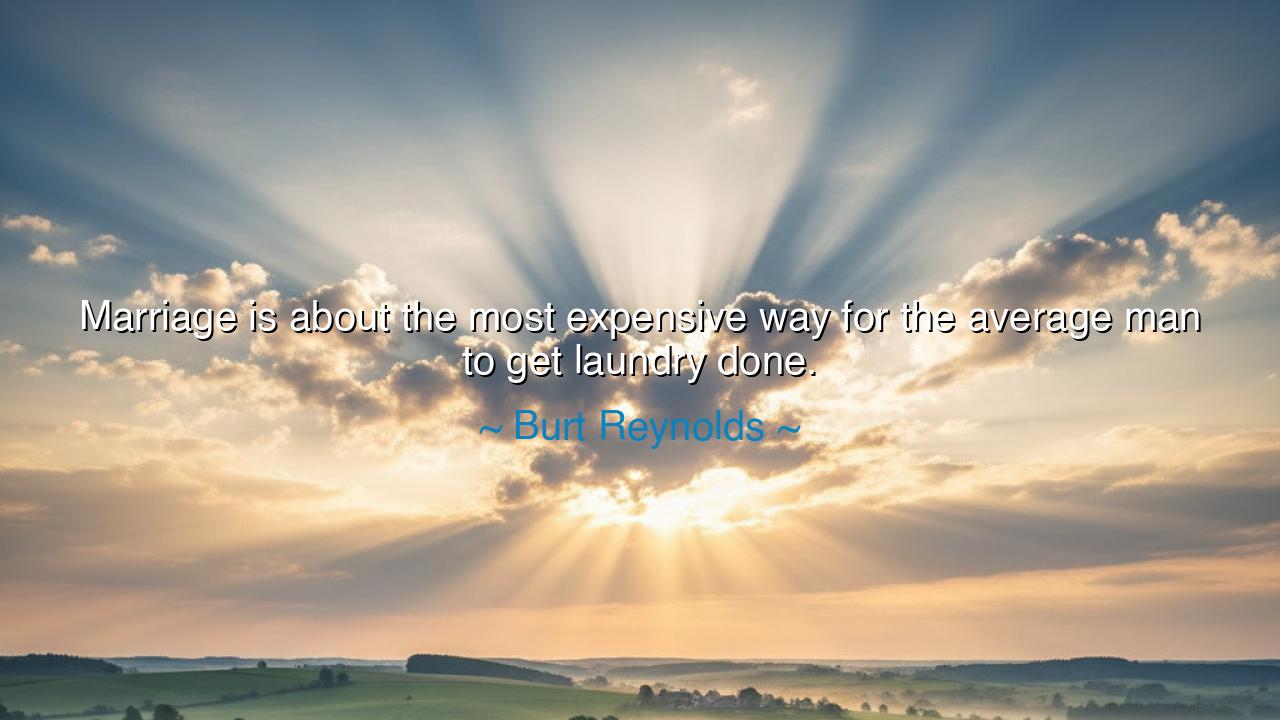
Marriage is about the most expensive way for the average man to






The words of Burt Reynolds, “Marriage is about the most expensive way for the average man to get laundry done,” are wrapped in humor, yet beneath the jest lies a deeper commentary on the expectations, misunderstandings, and evolving nature of marriage itself. Reynolds, a man of wit and charm, was no stranger to the trials of love — his own relationships, marked by both passion and fracture, gave him the right to speak with irony. His quote, though lighthearted on the surface, exposes an ancient truth: that love often becomes entangled in duty, and that the sacred union of two souls can, when mismanaged, descend into the trivial and transactional.
In the style of the ancients, humor has long been the cloak of wisdom. Aristophanes, the Greek playwright, once said that laughter is the mirror of human folly — it allows truth to be spoken where solemnity might be resisted. So too does Reynolds, through jest, remind us of the danger of reducing marriage to convenience. When a bond meant to be sacred becomes defined by material exchange — by chores, by bills, by “who does what” — then the divine poetry of love fades into mundane prose. His humor bites because it is true: too many enter marriage seeking comfort rather than connection, utility rather than unity.
The ancients taught that true partnership is not measured by labor divided but by purpose shared. When marriage becomes a ledger of duties rather than a covenant of hearts, it loses its fire. Reynolds’ jest — that marriage is an “expensive way to get laundry done” — mocks not the institution itself, but the shallow way modern people sometimes approach it. The “expense” he speaks of is not merely financial; it is the emotional cost of entering a union without understanding its weight. The man who seeks only ease in marriage will find toil; the one who seeks growth will find peace.
Consider the story of Marcus Aurelius and Faustina, whose imperial marriage was both partnership and test. History tells us that their union was not always tranquil, yet Marcus, the philosopher-emperor, spoke often of duty, patience, and gratitude toward his wife. He understood what Reynolds’ jest conceals: that love requires both service and self-awareness. The great challenge of marriage is not to escape its chores but to see in them the expression of care — to wash, not clothes, but the heart of pride and selfishness that soils every union over time.
Burt Reynolds, ever the showman, was also a philosopher in disguise. His quip is a mirror held to the way men and women often misunderstand one another. Many enter marriage expecting comfort, but true marriage demands effort. Many expect gratitude, but true love asks for giving without counting. What Reynolds reveals through jest is the folly of treating marriage as an arrangement of convenience rather than an alliance of souls. To those who take his words only as cynicism, he offers a challenge: laugh, yes, but then reflect — what do you truly seek in union?
In truth, every jest about marriage is also a lament for what marriage could be. Reynolds’ humor hides the ache of one who has known both the sweetness and the sorrow of commitment. Beneath his sarcasm lies the yearning for something nobler — for a relationship that transcends daily drudgery, that turns duty into devotion. When love is strong, even the mundane becomes meaningful; when it is weak, even luxury feels empty. Thus, the “expense” of marriage is not in money, but in the courage, patience, and humility it requires to make two lives move as one.
Let this, then, be the lesson for those who listen: do not mock love’s burdens — transform them. When you fold your partner’s clothes, when you clean, when you labor, do so not as a servant but as a companion in the great work of life. For it is not the chores that make marriage heavy, but the heart that forgets why they are done. To laugh at marriage, as Reynolds did, is to admit that it is flawed — but to honor it, as wisdom teaches, is to turn even its flaws into forms of grace.
So, the humor of Burt Reynolds becomes a kind of ancient parable in modern tongue: a jest with a soul. It warns against entering love with laziness, against expecting happiness without effort. For in the end, marriage is not about laundry or expense — it is about partnership. And when two hearts learn to serve each other not out of duty but out of joy, even the most ordinary acts become divine. Thus, laugh at the joke — but learn from its truth: that the price of love is not what you pay, but what you give.






AAdministratorAdministrator
Welcome, honored guests. Please leave a comment, we will respond soon